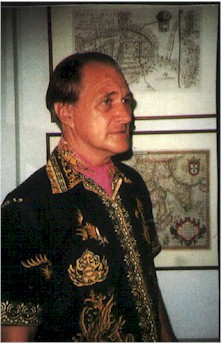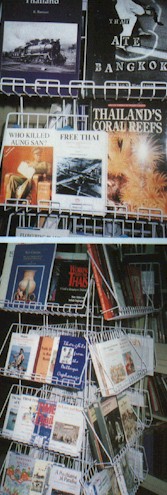KNOW YOUR PAST TO CHART YOUR FUTURE
by

 So
says Diethard Ande, the publisher and owner of White Lotus Books, a company which carries
new and out-of-print books on Asian art and culture as well as old maps and prints
(sixteenth to nineteenth century). White Lotus' specializes in books on Burma, Vietnam,
Yunnan, Cambodia, Thailand, Laos, Malaysia, Indonesia, China, India, Northeast India,
Central Asia, and the Himalayas. Mr Ande was born in Flensburg, Germany and studied
industrial engineering and economics in Berlin during the student revolution. He came to
Thailand twenty-eight years ago. Scott Murray recently had a chance to talk with Mr Ande
and the following are excerpts from the interview.
So
says Diethard Ande, the publisher and owner of White Lotus Books, a company which carries
new and out-of-print books on Asian art and culture as well as old maps and prints
(sixteenth to nineteenth century). White Lotus' specializes in books on Burma, Vietnam,
Yunnan, Cambodia, Thailand, Laos, Malaysia, Indonesia, China, India, Northeast India,
Central Asia, and the Himalayas. Mr Ande was born in Flensburg, Germany and studied
industrial engineering and economics in Berlin during the student revolution. He came to
Thailand twenty-eight years ago. Scott Murray recently had a chance to talk with Mr Ande
and the following are excerpts from the interview.
How did you end up in Thailand, and what did you do when you first arrived?
In the `60s I traveled around Asia for eight months to try and find out what country would be the most comfortable to live in. Thailand was one of the countries I liked because of the climate and the working conditions here. India was a socialist country and East Asia was just too cold, and so on. I came to Bangkok in 1970 and got a job with the German-Thai Chamber of Commerce. I was there for about two years and then I started my own company, White Lotus. In the beginning I sold spare parts for cars, special lubricants, and I also sold and exported antiques, orchids, handicrafts, textiles, jewelry, and so on. Then I started selling books on a small scale. I started importing paperbacks and selling them to hotels. I also started distributing two art magazines out of Hong Kong, Arts of Asia and Orientations. As I had dealt with antiques before I knew what collectors wanted and I knew what antique dealers wanted too. I built up a very strong collection of ceramic books, and books on Chinese painting and textiles. Again items that collectors wanted.
What about your start in publishing?
At that time there were Yao paintings on the market, but no one knew anything about them. In 1982, I found the one specialist on the Yao, Jacques Lemoine, and I told him that if he ever published a book I could sell it for him. So I ended up publishing Yao Ceremonial Paintings, and it became my first big success.
These paintings were not known before that. They gradually came on the market as the Yao were displaced from Laos.
There were two forces destroying the Yao culture: the communists they were fleeing from, and the missionaries who discouraged their bringing their cultural heritage (`heathen stuff') with them as they tried to flee to the US. Lemoine told me that one day the Yaos will need my book to reconstruct their religion which is a form of Taoism. Anyway, that was my start, and a successful one from the scholarly point of view.
Altogether, I have between 15,000-20,000 titles. In the last few years I have published about twenty books a year. After the initial importing business I started selling antiquarian books then I got into publishing and later I branched out into old maps and prints. I have a number of co-publications with Oxford University Press, Hong Kong University Press, Westview Press and others. I will co-publish a book on Chamlong Sirimung with Hurst, as well as other works with Zed Press.
What types of books do you prefer?
I like narrow in-depth subjects like The Railways of Thailand, Yao Ceremonial Paintings, Thailand's Coral Reefs etc. which big companies do want to touch because they are too specialized, or things which disappear which I think should be preserved. We should know our past to chart our way to the future. I publish works which are in danger of disappearing. We need historical background that's why I like to do archaeological books, historical books, sociological books and of course art books. I have also published a book called Flowering Plants of Thailand which has been quite popular. Although I have branched out into fiction in the past I've stopped that. It is not my strength. I try to stick to things in which I have a comparative advantage.
How do you go about selecting an author or a book to publish?
 Thailand is unique because all the scholars and travelers going to Burma,
Laos, Cambodia, Vietnam and Yunnan come through here and they see my books in either
Bangkok or Chiang Mai.
Thailand is unique because all the scholars and travelers going to Burma,
Laos, Cambodia, Vietnam and Yunnan come through here and they see my books in either
Bangkok or Chiang Mai.
I get all types of scholars visiting my bookstore and I ask them what they are working on and some of them ask if I would like to publish their work when it is completed.
If we agree to collaborate the manuscript goes to one of my editors who then edits it and sends it back with some questions for the writer. Then it goes to a typesetter who formats it, and typesets it. All of these people are freelance and they don't start right away. Problems usually arise such as a missing photo etc. So it can take half-a-year or more. It also depends on the time of year and what is going on in that year e.g. a couple years ago everyone was busy with books on the king's anniversary so my books were not a top priority. Then again, if the manuscript is clean it can take only a few months.
If I know the author I don't usually have to worry about the quality of the book. If I know the subject I can make a decision in five minutes. If I don't know the subject, or I'm not sure about it, I give the manuscript to people who know more than I do about that particular field. Then the experts will tell me if it needs improvement.
The old stuff is usually copyright free. When it does have a copyright like Ying-yai Sheng-lai (The Overall Survey of the Ocean's Shores) by Ma Huan, I ask permission and pay a fee.
I also attend conferences abroad like the Asian Studies Conferences in America where I approach people and ask them if they have anything scholarly and if I am interested in it I ask them if they would like me to publish their work.
When I go to exhibitions like the Frankfurt Book Fair and I tell people that my books are printed here instead of just taking it for granted, they are astonished. Why is that? Because Bangkok doesn't have a good reputation concerning literary endeavors. I think it is incumbent that all reporters working here try and report on the good things that happen here and not just write about the bad things that go on in Pattaya and Patpong. After all Thailand is very liberal and the only country in this area which does not censor books.
Would you like to recommend any of your books?
There are so many really and it all depends on the reader's specific interest. My latest success is Working with the Thais by Henry Holmes and Suchada Tangtongtay. It really is a must for foreigners working here and it is also useful for Thais for they can gain a better understanding of the problems farangs are confronted with in Thailand.
You have had to deal with quite a number of characters in the publishing business, how do you handle them, and their personality quirks?
I always try to separate the work from the personality. I may not admire some of the personality traits of the authors I publish but I can still appreciate and like their work. I have a sympathy and understanding for those who try and do things in a different way. Also, if some of my authors are thought of as eccentric, well they are usually more fun to deal with anyway due to their creativity because they have original ideas and an original approach. And that's what counts in the end.
I recently published Philip Blenkinsop's coffee table book The Cars That Ate Bangkok, You might have called the collaboration `unorthodox photographer meets crazy publisher.' I like Philip and I like his book. Some say it is morbid. But he has something to say in his way, and his work appeals to me. Asia Books only took a few copies for one shop. This book is a cry against traffic atrocities in Bangkok. Whether people like it or not, it is a fact. Philip doesn't make up anything. It's too bad that one of the biggest bookstores in the country doesn't have the guts to put this book in all of its shops.
Future plans?
I will soon be opening a showroom for my old maps and prints. I have never had a shop for them before. Previously, I had only shown then in exhibitions like the one the Christ Church on Convent Road used to have. I think that my prices will be quite reasonable because my overhead will not be very high. A big publisher like Oxford has to employ everyone in house but I can freelance a lot of my work out to others and this makes White Lotus a "leaner and meaner" company I think.
My life and my work are fully integrated. My office hours are eight to five and anytime I am here. This year so far I've published fifteen books, and by year's end I hope to publish ten more. White Lotus is a Thai company and I like Bangkok as it is really an ideal place for my type of books which specialize on Southeast Asian studies.
For more information contact Diethard c/o:
White Lotus Co., Ltd.
GPO Box 1141
Bangkok, Thailand
10501
Tel: (662) 332-4915, 741-6288(9), 741-6066
Fax: (662) 311-4575, 741-6287, 741-6607
E-mail: ande@loxinfo.co.th